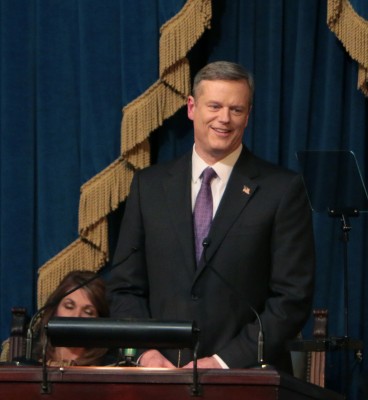
Massachusetts Gov. Charlie Baker, along with members of the Task Force on Persons Facing Chronically High Rates of Unemployment and the Labor and Workforce Development Secretary Ronald Walker II, proposed a plan Monday to tackle high unemployment rates within the commonwealth’s minority populations.
The initiative includes a $5 million investment aimed at creating a statewide public workforce system, according to a Monday press release. This system would complement the federal funds in order to emphasize job-training opportunities.
Colleen Quinn, spokesperson for the Executive Office of Labor and Workforce Development, said the plan targets populations that experience an unemployment rate higher than the Massachusetts average of 4.7 percent.
“The goal is to provide grants to community-based organizations that have the experience and expertise to reach people who face employment barriers and can provide a more hands-on touch,” Quinn said. “We know that certain populations … face unemployment rates that range from 7 to 12 percent, which is higher than the statewide average.”
Quinn said she believes the initiative will improve the workforce by adding new training opportunities and educational programs.
“Through these efforts and partnering with community-based organizations, businesses will have deeper engagement with people who need more support to find a job — people who need training or education,” Quinn said. “If we support organizations that help people with the barriers they face, we’ll be able to give them more attention and more assistance in job-seeking.”
Quinn said the EOLWD does not have fixed quantified objectives, but it will adapt accordingly.
“It is a long-term investment, but this money is for one budget cycle, for the Fiscal Year 2017,” Quinn said. “We will track our progress annually by comparing the unemployment rate of those populations with the statewide average.”
Daniele Paserman, a professor of economics at Boston University, wrote in an email that from an fiscal perspective, the plan could prove beneficial.
“Overall, I think this is a laudable initiative and a step in the right direction to address the high rates of unemployment for certain disadvantaged groups,” Paserman wrote. “Much of the existing research on unemployment has shown that active labor policies, such as job training, tend to be effective. The fact the funds are directed towards organizations that already have experience in dealing with these populations can be a plus.”
Paserman also cautioned that it is too early in indulge in excessive optimism.
“At the same time, the devil is in the details, and it is difficult to forecast the extent to which this policy will reduce unemployment among these groups,” Paserman wrote. “If the overall state of the Massachusetts labor market continues to be strong, as it has been in recent years, there are grounds for cautious optimism.”
Several residents said that they believe the initiative could have a beneficial impact on reducing unemployment inequalities experienced within Massachusetts’ population.
Paul Hanley, 68, of Fenway, said he is hopeful that the $5 million investment plan will create new job opportunities.
“I think it’s a great idea to invest money on unemployment issues,” he said. “In Boston, you can definitely feel the differences and the inequalities between certain groups in the population, and I hope this initiative will have a positive effect on employment.”
Jack Davis, 21, of Back Bay, said he firmly supports the initiative, especially in terms of promoting equality and helping disadvantaged populations.
“[The initiative] gives people who have fewer chances more possibilities,” he said. “I have strongly felt the inequalities among the Boston population, for instance, with the homeless people, and the whole American Dream seems to fall flat sometimes.”
Matthew Matuska, 21, of Fenway, said he could relate to the desire to change specific populations’ situations and to encourage people to find jobs.
“I’m currently working with Syrian refugees, and it’s really sad to see how humans turn their backs on people who are down or out of luck,” he said. “It’s great that there are programs trying to change that. I think Boston as a community is pretty strong, but there is definitely more to be done.”





















































































































